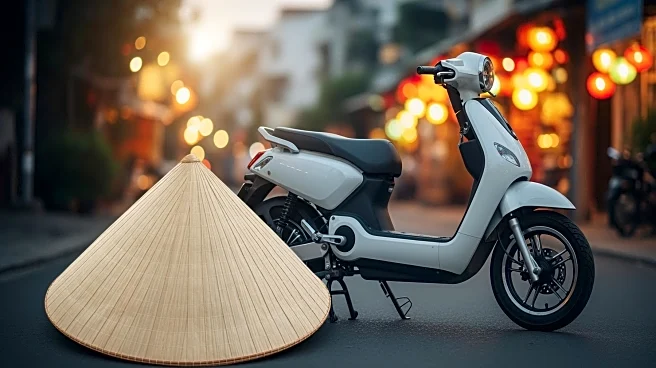What's Happening?
Vietnam is undergoing a significant transition from gas-powered motorbikes to electric ones, driven by government initiatives to reduce emissions and air pollution. Hanoi plans to ban fossil-fuel motorcycles from its city center by July 2026, with Ho
Chi Minh City considering a similar move. The government aims for a substantial portion of vehicles to be electric by 2030. This shift is met with mixed reactions; while some see it as an opportunity for cleaner transportation, others are concerned about the affordability and practicality of electric bikes. The motorbike is a central part of Vietnamese life, essential for small businesses and daily commutes. Major motorbike manufacturers like Honda and Yamaha express concerns over the ambitious timeline, while local electric vehicle companies like VinFast and Dat Bike are preparing for the change.
Why It's Important?
The transition to electric motorbikes in Vietnam is significant for several reasons. It represents a major step towards reducing air pollution and improving public health, as motorbikes are a primary source of emissions in urban areas. The shift could also stimulate the local economy by boosting domestic production and attracting investment in electric vehicle technology. However, the transition poses challenges for consumers and businesses reliant on affordable and reliable gas-powered bikes. The success of this initiative could influence other developing countries facing similar environmental and economic challenges. The outcome will depend on the government's ability to provide sufficient incentives and infrastructure to support the adoption of electric vehicles.
What's Next?
As Vietnam moves forward with its plans, several developments are expected. The government will likely continue to offer subsidies and incentives to encourage the purchase of electric bikes. Infrastructure improvements, such as the establishment of battery-swapping stations, will be crucial to support the transition. The response from major manufacturers like Honda and Yamaha will also be pivotal, as they adapt their strategies to align with the new regulations. The success of local companies like VinFast in capturing market share will be closely watched, as it could set a precedent for other markets. The broader impact on Vietnam's economy and environment will unfold as these changes take effect.
Beyond the Headlines
The shift to electric motorbikes in Vietnam also raises broader questions about sustainable urban development and the role of government policy in driving technological change. The cultural significance of motorbikes in Vietnam adds a unique dimension to this transition, as it challenges long-standing habits and economic structures. The initiative could serve as a model for other countries grappling with similar issues, highlighting the potential for technology to address environmental challenges while fostering economic growth.















